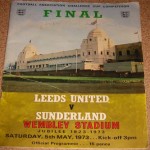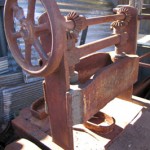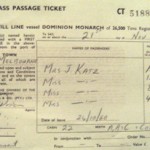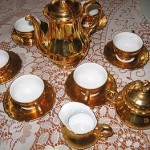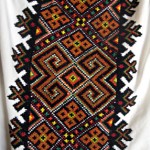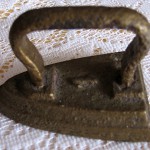Chafic Ataya shares his migration story with the Sydney Morning Herald online as part of their mini-documentary on the arrival of the Misr in 1947.
Lebanese
Schweir, Lebanon
Port Suez, Egypt on 3 March 1947
Melbourne on 30 April 1947
I stayed with relatives in East Brunswick, Melbourne for a month then moved to New Zealand.
Salesman in my mother’s cousin’s shop in Walgett, north-west NSW.
Hawker in north-west NSW; nightclubs in Kings Cross, Sydney; taxi driver; poet and author.
I was born in one of the most beautiful and inspiring towns in Lebanon, Schweir, which is also known as Dhour-el-Chouer. I had a beautiful childhood until I lost my dad at the age of seven. He passed away leaving six children behind with hardly any income. We were put in orphanage schools and then the Second World War started in September 1939. The orphanage shut down and we were sent [back] to our hometown and mother.
Mother did all she can to give us a bit of education and worked as a cook to feed us. At the same time my aunty in New Zealand support[ed] us by sending clothing and money. We’re Orthodox [and] Mum went to the Orthodox Church and asked if they could help. Somehow they couldn’t so she went to the Catholic [Church] and they were very receptive. [Later] we became boarders at the monastery and they wanted me to become a novice monk but it didn’t suit me. I like to be free. Always free. The freedom of intellect. I started writing poems from the age of 13, in Arabic at that time. I still have the exercise book that was my writing pad and kept it ever since. It was so dear to me and still is, containing my first poems ever.
Immediately after the war I found my way to New Zealand thanks to the ANZAC soldiers in my hometown during the war. I spoke a little English – my school taught us English as a third language after Arabic and French – and I start to mix with the soldiers and learn a bit more.
My father’s sister lived in Henderson, New Zealand – they are the winemakers AA Corban & Sons – and my aunty was so kind to us as children orphans. The soldiers encouraged me to [go there] as a student. One wrote on a piece of paper “take me to New Zealand as a student” for me to send to my aunty. And I did.
Now I remember how I used to make my living. I used to take fresh eggs and fruit in exchange for Australian bread and tinned beef, and race back home to feed my little brothers and sisters and race back to get more! My love grew for this part of the world because of the ANZAC soldiers. They even taught me how to smoke a cigarette. I insisted I wanted to have a draw and got dizzy!
I left Lebanon at the age of 16. When you have an inquisitive mind, you cannot help but follow. I was so anxious to leave and discover something. I love adventure and exploration and took these binoculars with me. They are very special; from [my] grandfather to father, then my uncle [who] took possession because we were very little. They were bought in Lebanon but are from France. While we were at home we used to look towards our vineyard [to see] if anyone’s trespassing or stealing grapes or figs. They meant a lot to me so I asked [my uncle] for them. By bringing them with me, I could explore the ‘New World’! I want to leave the binoculars for my children.
I wasn’t good at backgammon at that age because I was involved with studies and writing. But because [the] ‘big guys’ use it, I want[ed] to be a big guy and bring it along. It was purchased by the family; we went on a tour from my hometown to Damascus [and] bought it there. [The set] is Syrian-made, hand-made. Very expensive. We played with it on the ship.
I didn’t realise I could be so sad until after I left. I went by car to Palestine from Beirut before it was partitioned – it was early 1947 – and stayed two days in Haifa Hotel. My mother told a young man and his sister to take care of me. They were the ones who looked after me on the boat and kept me under control. I felt so sad after that. Something [was] stuck in my throat and [I] wanted to cry. Ever since I left my [family] and friends in my hometown, I used to cry a lot on my own. Somehow a volcano of poetry started to erupt through me because of the nostalgia.
I then went to Ismailia (Egypt) on the Suez Canal by train, and onto Cairo by train. On the train I met Australian boys who were sailors. They taught me how to open a bottle of beer. How? They put the tip of the bottle against the window, hit it hard and then the top would come off. They gave me a sip; I hadn’t drunk beer before.
We stayed two weeks in Cairo. It should have been two days but they said the ship is late. I ran out of money [so] when we boarded the ship I went to the purser and they sent a telegram to my aunty in New Zealand to send money. She sent £10 and I was rich!
I took the boat SS Misr from Port Suez to Mombasa (Kenya), and then to South Africa. It wasn’t a big ship, it was a disposed navy vessel [of] 7,000 tons. An Egyptian company bought it from the Allies and turned it into a commercial ship. Misr is ‘Eygpt’ in Arabic. Literally.
We were about 250 passengers in each dormitory [with] at least three or four dormitories and about 1,000 [passengers]. [It] was to pick up a South African football team to play in Australia. When I was in Durban I had a friend with me and we started to climb hill after hill and I thought I would see all of Africa with the binoculars!
Durban to Fremantle took us 15 days. We saw nothing but sea and sky. The ship was so small and sea so rough. They told us they were going to sound the siren to escape but we didn’t vacate in the end. We were so happy when we arrived in Fremantle, it took us one month to arrive. What an impression I had, everything was well organised. The eggs had [expiry] dates on them, I couldn’t believe it.
I had to stay in Melbourne where I had some relatives. It was good, immediately I made friends. When you’re young, you integrate quickly. I liked Melbourne. There’s something tender and fine about that city.
There were hardly any passenger ships in those days [so] they put me on a cargo ship [to New Zealand]. We were only five passengers [and] arrived in Bluff on the South Island, near Invercargill. My cousin met me [there] and brought me up to Auckland. I finished my high school in New Zealand [and] I started to write poetry in English. I wanted to continue with my education but it’s a sad story and I ended up coming to Australia.
My cousin and his wife belong[ed] to a Pentecostal sect. They wanted to send me back to Lebanon because I refused to be in the streets of Auckland preaching the gospel and things like that. Father Michael Shehadie came over from Sydney; he used to visit my relatives like it was a parish that extended all the way to New Zealand. I decided I wanted to go to Australia and my aunty and I asked if he could bring me over. My mother had a cousin in Walgett [in north-western New South Wales], and Father Shehadie got in touch to see if they could give me job and accommodation. I got the visa as an immigrant, not a student.
I came by the flying boat [and] landed in Rose Bay [Sydney] on my 20th birthday, 5 April 1950. I stayed with Father Shehadie in Randwick for two to three weeks. Nick Shehadie, his son, now Sir Nicholas, used to have a menswear shop on Peter’s Corner (Alison and Belmore Road, Randwick). I used to come to his shop every day and he gave me a beautiful tie; it was floral; green, red and yellow and wide. I was sad I lost it in my many moves.
Father Shehadie took me to the station and I went to Walgett by train. [It was] 24 hours – never again! I spent three years in Walgett and was a salesman in my mother’s cousin’s shop – menswear, womens’, sports goods, jewellery, rifles, anything! I became a hawker at the weekend. He used to send me to sheep stations to earn more money. We didn’t have to have a license to sell or buy guns because people were very civilised in those days. You could sleep in the bush with doors and windows open – that was the ’50s.
I also worked in my cousin’s house and garden which I preferred. Somehow I felt sorry for people when we buy for $1 and sell for $2. My conscience never believed in business, but I had to do it. Eventually I left him because he wouldn’t give me [a] raise of ten shillings a week for seven days work. I rebelled and led a nomadic life; started my own business, bought a van, hawking from one town to another. I can name north-west NSW by the inch. I followed the shearers and [would] wait ’til they have a break. I camped on riverbanks amongst Indigenous people, sharing their dreams and listening to their awe inspiring tales.
That’s a wallet, kangaroo leather. This is one of the things I used to sell. I kept that as a souvenir before I went back to Lebanon. It’s 56 years old and in very good condition.
I used to come down to the city [to] stock up. A friend of mine in Kings Cross started nightclubs. I became involved [with its] finances and stayed at his apartment. Pigalle [was] in the hotel called Gleneagles. It’s exactly where the Bourbon Bar is now. Pigalle wasn’t licensed, I don’t care if the police knows now. You know how? We’d serve a coffee and pour a bit of cognac into the coffee on request for double [the cost], five shillings! We lost the lease, then moved downstairs and opened Tabou. Sometime later my photo was exhibited in a window in Pitt St, Sydney by a United Nations photographer [intended for the] collection, The Family of Man.
I was moving between the city to country as you will see in my poem The Drover and I 1 , which is true to life. Not a word of lie, it’s real. I was always connected with Kings Cross and the bush [at] the same time.
I took up driving cabs in 1959 until I got fed up. Some passengers would call me unfavourable names as a foreigner, but the best I heard was to go back from where I came. It was 12 years; [I was] longing for my homeland [and] wanted to see my mother before she died. I went back to Lebanon that year and this is a postcard of the ship that took me from Sydney to Port Said (Egypt). I took another boat to Beirut because the Fair Sky went on to Italy.
I did higher education in Lebanon. I had the facilities – my home, my people – and I joined the English teaching program. I became a high school teacher, then was 25 years as the chief marketing instructor for Middle East Airlines, including 17 years of teaching English as a second language at the American Language Centre in the evening. I was also in different parts of the Arab world, mainly Iraq, for two years.
During the 1975 war I got married because I couldn’t go out anymore! The war had no end, it wouldn’t stop. My three daughters were born in Beirut during the war. Running to school to bring the children, showers of bullets. Bombs and bullets from every side. Then running away to the mountains for the children. Then to Cyprus, back to Beirut, then back to Cyprus, then to USA, then to Canada. This is no life.
I decided to come back here to save the children. I wasn’t afraid, but why should they pay the price? I left my wife and children with her sister in Ottawa (Canada) for one year. I went back to Beirut and resigned. I didn’t like Canada because of the weather although I was born in the snow – my hometown is 5,000 feet above sea level. Why should I be in Canada when I have a love for Australia? I had nostalgic feelings and I love the beaches, the climate, people and the bush.
We came over to Australia in 1987 and lived in Edgecliff for three years. We took a furnished apartment but I couldn’t afford it; I couldn’t secure a permanent job. I didn’t want to go back to Lebanon – the war was still raging. It was very difficult for me at my age. I was 57. We exhausted all we saved from Lebanon and I applied to the Department of Housing and they gave me this [apartment] – it’s a blessing. We’ve been here for 17 years and my children are now university graduates and happy here.
I invited Nick Shehadie to my book launch for Tears In Wine. He couldn’t make it as he says in his letter. He remembered me [and] cannot forget when I stayed with his family in Randwick and how he gave me the tie. In the letter he says his taste in choosing ties has improved a lot! So it wasn’t a good tie he gave me, but to me it was beautiful.
I went to Lebanon for my nephew’s wedding last year in 2006. There was peace. Beautiful. You couldn’t hear a shotgun. Then I went to Italy. While I was there the war started. My friends joked that I started it and ran away again. Most of my clothes were still in Beirut and I couldn’t get back so I caught the plane direct from Italy.
I’m an Australian citizen. It’s my adopted home and there’s nothing better than having a home. Somehow when you reach a certain age, the whole world means one thing for you – convenience. Wherever it’s more convenient for me, my wife and children that’s the place to be. I have an affinity with this land since I was young and couldn’t choose better. Of course I would always like to go back to my birthplace, my country, where I grew up as a child, which I will always like forever ’til the day I die:
The hills of Lebanon are calling me
to go back where I had a home. 2
Now I have a home here – Australia.
Interviewed by:
Andrea Fernandes, NSW Migration Heritage Centre
18 January 2007
Footnotes
1. The Drover and I is in Chafic Ataya’s book, Empty Shell.
2. Excerpt from Chafic Ataya’s poem The Hills of Lebanon in his book, Empty Shell.



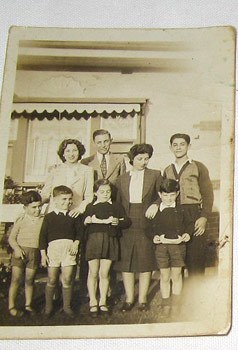
![[L-R] Chafic Ataya, Leslie Corban and Michel Malouf, Walgett, 1953 [L-R] Chafic Ataya, Leslie Corban and Michel Malouf, Walgett, 1953](../../../cms/wp-content/uploads/2008/10/photo-walgett.jpg)
![[L-R] Chafic Ataya and Austrian artist Hans Roth, Modca Café, Kings Cross, Sydney, 1955 [L-R] Chafic Ataya and Austrian artist Hans Roth, Modca Café, Kings Cross, Sydney, 1955](../../../cms/wp-content/uploads/2008/10/photo-chaficandhans.jpg)
!["I wasn't good at backgammon at that age, but I want[ed] to be a 'big guy' and bring it along [on the ship]. It was purchased by the family on a tour to Damascus, Syria."](../../../cms/wp-content/uploads/2008/10/backgammon-150x150.jpg)
!["I left Lebanon at the age of 16. I love adventure and exploration and took these binoculars with me. They are very special-from [my] grandfather to father, then my uncle [who] took possession because we were very little. By bringing them with me, I could explore the 'New World'!"](../../../cms/wp-content/uploads/2008/10/binoculars-150x150.jpg)
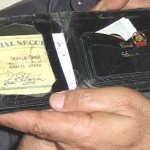
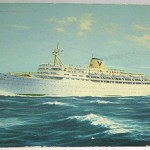

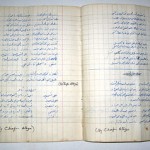
!["I invited Nick to my book launch for Tears In Wine in 2002. In his letter he remembered me [and] cannot forget when I stayed with his family in Randwick in 1950 and how he gave me the floral tie. He says his taste in choosing ties has improved a lot!"](../../../cms/wp-content/uploads/2008/10/letter-150x150.jpg)
